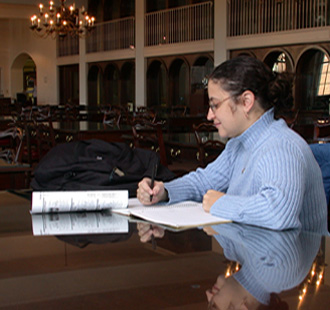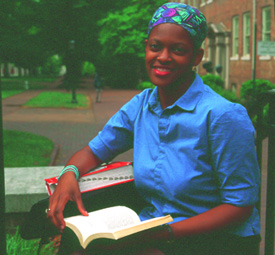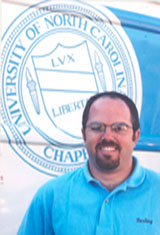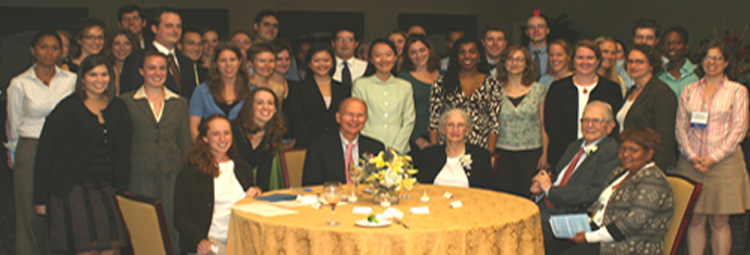

A publication of The Graduate School, University of North Carolina at Chapel Hill
On-Line Version Spring 2007
Home | Back issues | About us | The Graduate School | UNC-Chapel Hill | Make a gift
A
Lasting Mark
A foundation for excellence in graduate education
Malinda Maynor Lowery knew where she wanted her research to take her, she just did not know where to go for her doctoral education. A member of the Lumbee Tribe of North Carolina, Lowery earned her bachelor’s degree at Harvard University and a master’s degree at Stanford University before spending five years in California producing documentaries. Her films, which included explorations of the Lumbee culture and a feature-length documentary on Native American sacred places called “In the Light of Reverence,” garnered widespread acclaim and were shown at the Sundance Film Festival and on PBS. Lowery, however, sought to return to school to seek answers concerning the relationship between the United States and its Native Nations.
 |
| Malinda Maynor Lowery has dedicated herself to imparting the lessons she learned in the Royster Society as a history professor at Harvard. |
| Photo
by Will Owens |
Lowery’s interest in history and propensity for research led her to consider the University of North Carolina’s renowned program for her doctoral studies, but her extensive resume gave her numerous options. It was the unique opportunities presented by the Royster Society of Fellows that convinced her Carolina was the right choice. “It surprised me to learn about the Royster Society because I wasn’t expecting that kind of program at a publicly supported institution,” Lowery says. “I was also accepted into graduate school at Yale University and it offered a fellowship, but the Royster Society was just as competitive and had the added bonus of an interdisciplinary focus, which is unfortunately rare in graduate school.”
Through her experiences as a filmmaker, Lowery was accustomed to working with people from different backgrounds. As part of the 2000-01 Royster Society class, she was able to increase her versatility and establish relationships with colleagues in different disciplines, a skill she says is absolutely critical to navigating a university of any size and in any place.
“I am reminded almost on a daily basis of the things I learned while at UNC and the things I learned as a Royster Fellow. The reason the experiences were so fulfilling has to do with the interaction,” Lowery says. “The program’s interdisciplinary nature got me in touch with a lot of people from different fields. My own background as a Lumbee really influences my research and how I conduct it, and so it was neat to talk to other people whose backgrounds influenced them in particular ways.”
The Royster Society prepared Lowery for her future in other ways, too. She says the funding gave her the luxury of time to focus completely on her research. Lowery also had the opportunity to hone her public speaking skills and observe how other students presented their work at workshops held by the Society.
“The fellowship really helped me understand what made a strong presentation, what made a compelling message,” Lowery says. “That was an incredibly useful skill to have going into conference presentations and going into the job market. You want to know something about how your work sounds to someone who is not from your discipline.”
Lowery is now passing along what she learned through the Royster Society as an assistant professor in the history department at Harvard. She hopes to give other students with diverse interest and backgrounds the life-changing experience that she was afforded.
“The Royster Society was the main reason I decided to attend UNC-Chapel Hill,” Lowery says. “During my time there, it was the thing that kept me going.”
The
Roysters' Lasting Legacy
Lowery’s experiences with the Royster Society of Fellows are not
exactly unique. Since its inception a decade ago, the Society has become
a shining example of how private funding can help graduate students develop
into the leaders of tomorrow in a wide array of fields. Beyond providing
the necessary financial support for scholars to complete their doctoral
studies at Carolina, the Society has fostered a sense of interdisciplinary
learning and engagement not typically found within other financial aid
programs.
| Mary O'Connor says the unique aspects of the Royster Society help distinguish Carolina from other prestigious universities across the country. |
| Photo
by Will Owens |
The Royster Society got its start in the mid-1990’s when then UNC-Chapel Hill Chancellor Paul Hardin and other administrators spoke with Dr. Thomas S. and Mrs. Caroline H. Royster about graduate students’ needs at Carolina. Hoping to make a lasting contribution, the Roysters gave a generous financial contribution, with which the Graduate School created an interdisciplinary fellowship program. Initially called the Carolina Society of Fellows, it was later renamed in honor of Dr. and Mrs. Royster, with the inaugural class of nine fellows selected in 1996.
Since that first contribution,
the Royster Society has grown to provide financial support for more than
160 graduate students. The fellowship provides support to
more than 50 students each year — support they can rely upon through
five years of doctoral study — covering the normal costs of doctoral
education like stipends, tuition, fees and health insurance. In addition,
it gives fellows the opportunity to travel to academic conferences and
meetings to present their research.
“The impact of Dr. and Mrs. Royster’s generosity to graduate education is seen in the remarkable growth of the program and in the quality of its alumni, who are leaders in their communities across the United States and the world,” says Dr. James Moeser, UNC chancellor. “Not only has the Society served as a University model for establishing successful fellowship initiatives, it also serves as an inspiration to new supporters of graduate education who are looking to invest in excellence.”
Now in its 10th year, the Royster Society is recognized as a significant force for enhancing the quality of education at Carolina. Graduate programs across the campus have attracted some of the most gifted students in the country, and the Royster Fellowship allows these students to perform at their very best as they partner with faculty in research and teaching and prepare to lead in a world of growing complexity. These students’ testimonies show just how much the Royster Society has made a difference for the University.
The Best and Brightest
Many future fellows are first drawn to Carolina by the university’s prestigious reputation before they ever become aware of the unique opportunities presented by the Royster Society of Fellows. As the cream of the crop, theses doctoral candidates often have their pick of schools and multiple funding sources are made available to them. The fact that the Society is more than just a resource for financial aid often plays a large role in the scholars’ decisionmaking process. As part of the Society, fellows join a support network of scholars across disciplines.
| The interdisciplinary facet of the Society has led to ongoing collaborations and lifelong friendships for fellows like Sharif Razzaque. |
| Photo
by Will Owens |
“In my experience applying
to graduate schools and knowing people at other schools, I’ve never
heard of anything like the graduate program here and the Royster program
in particular,” says Mary O’Connor, a fellow in ecology. “It
really reflects that they know what it takes to make successful graduate
students
and they do everything they can to give us that.”
Society director Peter J. Robinson says that the fellows are not the only ones who capitalize on their choice to attend Carolina. “Because of the Royster Society and because of the reputation of the University, we are persuading students to come to Chapel Hill who otherwise would have gone to places like Harvard or Princeton,” he says. “The Royster Society’s ability to attract such caliber of students brings a phenomenal kind of benefit. The students benefit, the university benefits and the whole state benefits.”
The influence of the Society does not stop, however, with the choice to attend Carolina. Fellows quickly realize how unique the program is.
“I have to say that while I was excited about the fellowship, since I understood that meant freedom from financial pressure and the chance to really devote myself to my scholarly work, I don’t think I could have possibly understood the full measure of the difference that the funding, as well as the community of fellows, would make to my work during the years I was in grad school at UNC — and since,” says Tara Powell, who earned her doctoral degree in English as part of the Royster Society’s second class.
The Society at Work
The interdisciplinary facet of the Royster Society of Fellows gives students an opportunity to broaden their intellectual horizons which they may not have otherwise had. Fellows from fields as diverse as English and biomedical engineering interact with each other and even collaborate on projects.
 |
| Andrea Williams says the social and intellectual support the Society provides is just as important as the financial support. |
| Photo
by Will Owens |
Andrea Williams, who earned her doctoral degree in English, says the ability to share research with other scholars across the University is the greatest aspect of the Royster Society. “The social and intellectual support of the fellowship was as important as the financial support to me,” says Williams.
Some fellows, like Sharif Razzaque, have taken interactions through the Society a step further by working with different departments. “Through the Society, I met folks in other fields that I otherwise would not have,” says Razzaque, who specializes in computer science. “This has helped my own education and research, and in one case, has resulted in an on-going collaboration between my department and the department of exercise and sports science.”
The Society enables fellows to devote themselves completely to their dissertations during their final year of study rather than having to balance teaching or working. “Without the fellowship, I certainly would not have been able to finish writing my dissertation in less than a year and earn my Ph.D. when I did,” says Beth Whitaker, who examined the socioeconomic and political impact of refugees from Rwanda, Burundi and the Democratic Republic of Congo on host communities in western Tanzania.
“The dissertation fellowship was a tremendous help to me — and I can’t state that strongly enough. It let me throw 100 percent of my time into writing the dissertation,” Razzaque says. “While I enjoyed being a teacher’s assistant before becoming part of the Society, I found myself spending most of my time doing that work, and wasn’t making fast enough progress on my dissertation. In retrospect, I think it would have taken me one to two years longer to finish without the fellowship.”
Preparing for the Future
Another major goal of the Royster Society of Fellows is to train students for leadership roles within their future careers. Programs are designed to develop presentation skills for fellows to prepare them to teach, speak at conferences, or simply go on job interviews. Fellows also learn to translate their academic research into terms understandable by lay audiences.
“One of the things I got to do frequently was to give presentations outside the immediate UNC community,” says Jory Weintraub, who specializes in microbiology and immunology. “As I went on to work in areas like science outreach and undergraduate instruction, I had developed these skills through the Royster Society and was wellprepared for my career.”
 |
| Jory Weintraub developed presentation and teaching skills through the Society that have proven invaluable in his ongoing work. |
| Photo
by Will Owens |
That ability to clearly discuss one’s work and relate to others is especially important when fellows move on with their professional lives after graduate school.
“I strengthened my critical thinking and speaking skills by presenting my developing research at Royster Society meetings,” Williams says. “But being a Royster Fellow, and attending many of the receptions with donors, also introduced me to the power of networking. Such skills now serve me well as a professor.”
Moving on
The Royster Society of Fellows
is undoubtedly an impressive experience for students to cite as they enter
their professional lives, but it tends to be much more than just a line
on a resume or curriculum vitae. For some fellows, the Royster Society
allowed them to pursue jobs they otherwise would not have
been able to.
“Because of the amazing financial help from the fellowship donors and my parents, I graduated without any debt. This freedom allows me to be daring in my job choices,” Razzaque says. “I’m currently part of a startup company that designs computer-assisted surgical tools, based on ideas that started at UNC. I absolutely love this work and expect it will one day help thousands of patients. Start-up companies are risky, and if I had debt to pay off, I would have needed a more secure job instead.”
Elizabeth Chew, the associate curator of collections at Monticello, says that being selected to be a Royster Fellow during her last year of dissertation writing in 2000 was just the jump start she needed. "Being a fellow gave me a sense of accomplishment and confidence in my last year when I was starting the job-search process,” she says. “It was also lovely to have on my CV the highest honor for a graduate student. It’s easy to slog away in graduate school and feel like no one is recognizing you, but the Society made me feel like my work was important.”
Other alumni have gone on to have great success teaching the principles of the Society at universities around the country. Whitaker, an assistant professor in political science at UNC Charlotte who will be up for tenure in the fall, has remained active at UNC-CH as a member of the Dean’s Graduate Education Advancement Board. Powell, a noted poet, teaches Southern Studies at the University of South Carolina.
“I love to talk to colleagues, students and members of the community at large about how important interdisciplinary work is to regional studies. I am confident that programs like the Royster Society make a real difference in our field and what we can accomplish,” Powell says.
Maintaining a Connection
In 2006, as part of the Royster
Society of Fellows’ 10th anniversary, the Graduate School brought
together current and former fellows for a weekend celebration. The event
celebrated the generosity of Dr. and Mrs. Royster as well as the work
of the fellows. Most of all, the event provided the fellows an
opportunity to show their thankfulness to the Roysters for the Society’s
impact on their lives.
“I’m very appreciative to the Roysters and the Society for giving me the opportunity to meet such an interesting and stimulating, diverse group of people,” Weintraub says. “I knew early on that my interest was in teaching and science education, and interacting with the other Royster Fellows reminded me that the science that I am doing is only a small part of the bigger picture of helping society.”
After a decade of helping fellows achieve their educational and professional goals, the Society is gaining momentum. The endowment that the Roysters have built along with the additional dissertation fellowships endowed by other generous donors will allow UNC’s graduate programs to continue to attract the best and brightest scholars whose work will shape the future of North Carolina and the country.
“I am always aware that completing graduate school may have been much more difficult without the generous support of Dr. and Mrs. Royster,” says Williams, an assistant professor in English at Ohio State. “As I progress in my career, I want to give back to UNC and the Society so that I can continue the wonderful tradition of philanthropy.”
- Joshua D. Meyer
 |
| More than a decade since their initial gift changed graduate education at Carolina, the Roysters' generosity continues to touch fellows' lives. |
| Photo
by John Dudley |
© 2007, The Graduate School, The
University of North Carolina at Chapel Hill
All text and images are property of The Graduate School
at the University of North Carolina-Chapel Hill. Contact Sandra Hoeflich
at shoeflic@email.unc.edu
to request permission for reproduction.